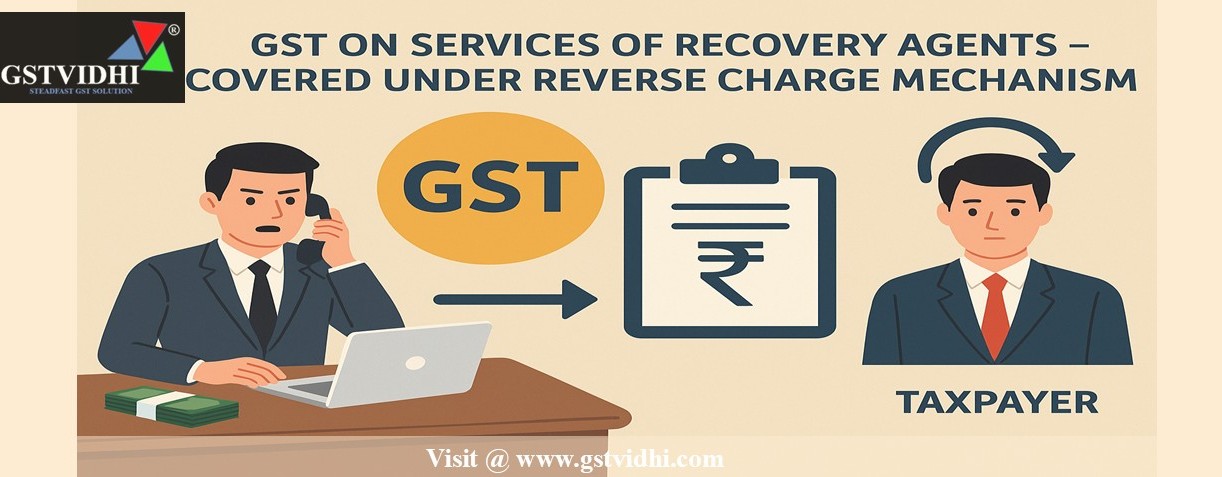
GST on Services of Recovery Agents – Covered Under Reverse
Charge Mechanism
Introduction
Under the Goods and
Services Tax (GST) regime, all services are generally taxable unless
specifically exempt. One such service that is taxable is the service provided
by a recovery agent. A recovery agent is typically appointed by banks or
financial institutions to recover outstanding dues from borrowers who have
defaulted on loan repayments.
While these services are
indeed taxable, the government recognized the practical difficulties that small
recovery agents would face in registering under GST, maintaining compliance,
and filing returns. Therefore, from the very beginning of GST (i.e., 1st July
2017), the government has brought such services under Reverse Charge
Mechanism (RCM) through Notification No. 13/2017 – Central Tax (Rate).
Let’s break this down in
simple terms.
Who is a
Recovery Agent?
The term “Recovery
Agent” is not specifically defined under GST law or any other law.
However, we can understand the term by analyzing its common meaning:
- Recovery
means collecting or regaining possession of money, goods, or property,
especially through legal methods.
- An Agent is someone who acts
on behalf of another person or entity.
So, a Recovery Agent
is a person or agency that acts on behalf of a bank or financial institution
to recover unpaid loans or dues from defaulters.
Example:
Mr. Ramesh works as a
freelance recovery agent. A bank appoints him to follow up with loan defaulters
and collect overdue payments. He visits the borrower’s location, negotiates
repayments, and helps recover money.
Even though Mr. Ramesh is
providing a service, he may not be registered under GST due to low income. To
reduce his burden, the tax liability is shifted to the bank (recipient of
service).
Definition
of Agent under GST
Under Section 2(5) of the
CGST Act, an "Agent" is defined as:
“A person, including a
factor, broker, commission agent, arhatia, del credere agent, an auctioneer or
any other mercantile agent, who carries on the business of supply or receipt of
goods or services or both on behalf of another.”
Thus, a recovery agent
clearly falls within this broad definition, as they are acting on behalf of a
bank to render services.
Taxability
of Services by Recovery Agents
The services rendered by
a recovery agent are treated as “Supply of Services” under GST. Since
there is consideration (payment for service), the transaction becomes taxable.
However, instead of
asking each individual recovery agent to pay the tax, the GST law shifts this
burden to the recipient, i.e., the banking company, financial
institution, or NBFC using their services.
Reverse
Charge Mechanism (RCM) – Applicability
Under Notification No.
13/2017 – Central Tax (Rate) dated 28.06.2017 (effective from 01.07.2017),
the Government specified certain services where the recipient is liable to
pay tax, not the supplier. This is known as the Reverse Charge Mechanism.
Entry under GST Regime
(w.e.f. 01st July, 2017) (Notification 13/2017 Central Tax (Rate)
|
Sl.
No.
|
Category
of Supply of Services
|
Supplier
of service
|
Recipient
of Service
|
|
(1)
|
(2)
|
(3)
|
(4)
|
|
8
|
Services
supplied by a recovery agent to a banking company or a financial institution
or a non banking financial company.
|
A
recovery agent
|
A
banking company or a financial institution or a non-banking financial
company, located in the taxable territory.
|
Hence, the bank or
NBFC receiving the service must:
- Pay the applicable GST on such
service under reverse charge;
- Account for it in their GSTR-3B;
- Issue self-invoice, if required;
- Claim Input Tax Credit (ITC), if
eligible.
Practical
Scenarios and Examples
Scenario 1 – Individual
Agent Not Registered
Mr. Arjun is an
individual recovery agent who works with ABC Bank on a contract basis. He earns
₹10,000 per month from the bank.
- His total annual income is ₹1,20,000
(below ₹20 lakhs threshold for GST registration).
- As per RCM, he is not required to
take GST registration or pay GST.
- The ABC Bank will pay GST
under RCM and can claim ITC if used for taxable output.
Scenario 2 – Recovery
Agency Registered under GST
M/s Fast Recoveries Pvt.
Ltd. is a professional agency registered under GST. It provides loan recovery
services to various NBFCs.
- Since they are already registered,
they may issue GST invoices.
- But still, as per notification, the
tax liability shifts to the recipient NBFC, not the recovery
agency.
- The agency will mention in the
invoice – “Tax to be paid under Reverse Charge by recipient as per
Notification 13/2017 – CT (Rate)”
Benefits of
Reverse Charge for Recovery Agents
1. No
Burden of GST Compliance – Small agents avoid the hassle of
monthly returns, registration, invoicing, etc.
2. Ease
of Doing Business – They can focus on their core work
(recoveries) without worrying about tax laws.
3. Wider
Opportunities – Banks and NBFCs are more willing to
hire such agents when compliance is simplified.
GST Rate
Applicable
The recovery agent
services fall under SAC Code 998599 – Other Support Services. The
applicable GST rate is:
- 18% (9% CGST + 9% SGST or 18% IGST)
This rate is paid by the recipient
under reverse charge.
Conclusion
In summary, services
provided by recovery agents to banks, financial institutions, or NBFCs are
clearly covered under the ambit of supply and are taxable under GST. However,
to ease the burden on small recovery agents, the government has smartly applied
the Reverse Charge Mechanism, shifting the compliance responsibility to
large, organized recipients.
Disclaimer: All the Information is based on the notification, circular and order issued by the Govt. authority and judgement delivered by the court or the authority information is strictly for educational purposes and on the basis of our best understanding of laws & not binding on anyone.
Click here